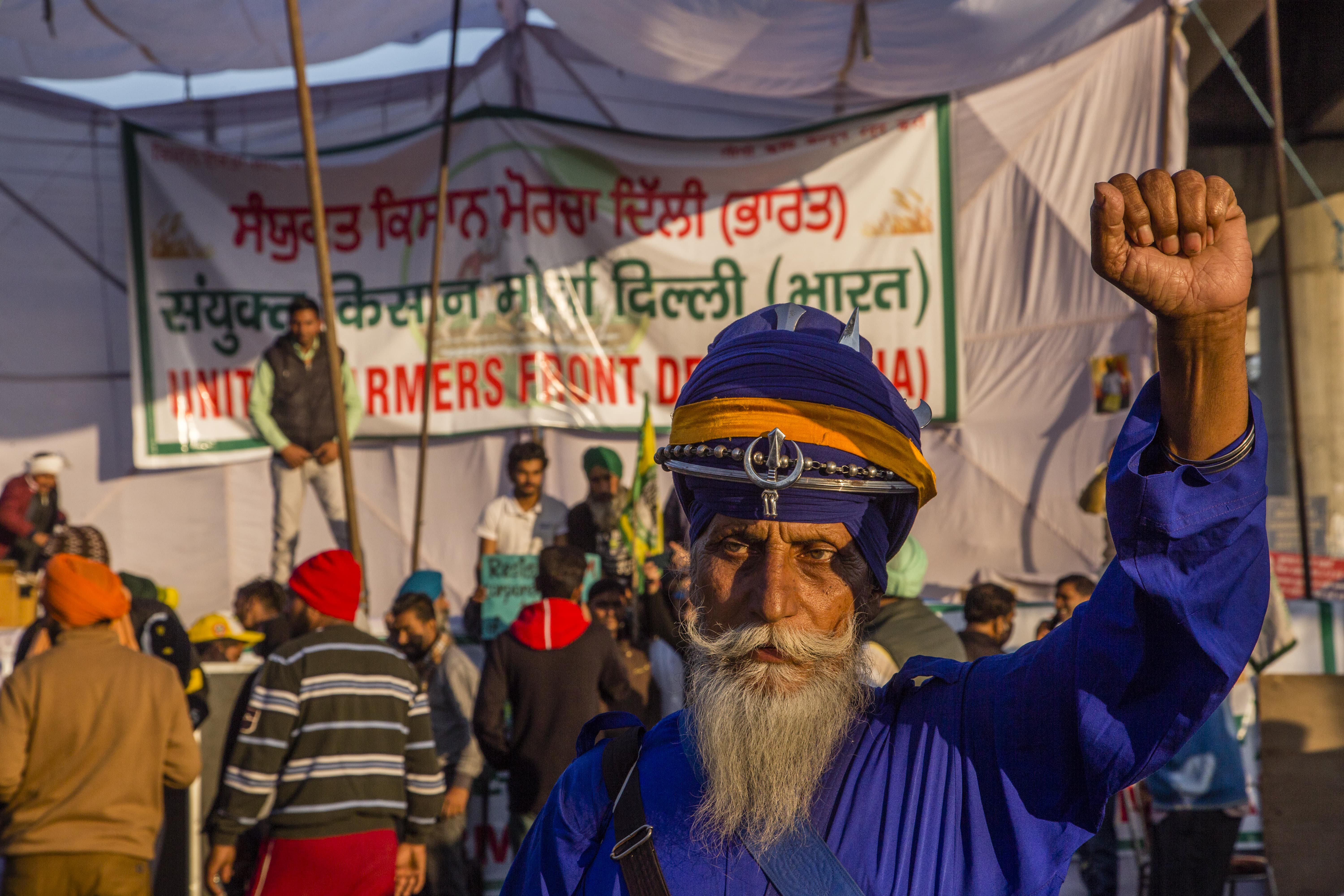When tens of thousands of Indian farmers began their agitation against three controversial laws enacted by the Indian government last year to "reform" the agricultural sector, they had no idea that their protests would soon put them in the crosshairs of powerful Indian media organisations.
Initially, their protests in the northern states of Punjab and Haryana escaped notice by the Indian mainstream media.
But once the demonstrations spread to other states and famers blocked a major highway just outside India's capital city, New Delhi, farmers started receiving attention from national media. Immediately they were surprised by what they saw as unfair media coverage.
To protest their coverage, they staged demonstrations, holding signs reading, "Don't cover us. You're fake media”and "Godi media [pro-government media, literally “lapdog media”] is not allowed here.”
Farmers have bristled at the media’s treatment of them, as they have been branded as "terrorists," "Maoists," "anti-nationals," Pakistani and Chinese agents, and even "Khalistanis," –– a term for the Sikhs who seek an independent homeland in northern India for members of their religion. Some media organisations have also accused the protesters of being foreign agents.
In order to combat what they saw as unfair media treatment and disinformation, farmers organized and started their own media outlets, starting novel, local forms of activist media to advance their cause.
Gurdeep Dhaliwal, 27, a farmer and documentarian, co-founded the Trolley Times, a media outlet which allows farmers to report on the protest in a way that they feel is accurate. So far, the outlet has more than 70,000 followers on Instagram, Facebook and Twitter and has been dubbed India’s “fastest growing newspaper.”
Since November 2020, Trolley Times has been publishing stories of the farmers and the challenges they face, both in print and on social media.
"We wanted to collect and tell stories of the farmers at protest sites. Our news outlet personalises farmers' stories and narratives for their [sake] first, and then, for the rest of the world," he told Al Jazeera Journalism Review (AJR).
"The idea was to create a strong bond and to build trust among the farmers who have come from various parts of India. We started with just 1,000 copies and now we are going strong with 7,000 copies,"Grudeep said from a protest site outside New Delhi.
Grudeep's team of "reporters and editors" have been reporting from the protest camps since November 2020, and are not sure when they will leave. Grudeep and his team fear reprisal from the state should they leave and slip out of the media spotlight, thus placing his staff in the strange position of relying on their sources for their own personal safety.
"We have received threats in the past. However, the team feels they are only safe if they stay within the protesting site, among the activists and farmers," he said.
Journalism under legal pressure
In September 2020, the Indian government introduced the Indian agriculture acts of 2020, also known as the farm bills, calling the laws necessary for "modernisation" of the agriculture sector.
Farmers strongly objected to these laws, seeing the reforms as putting their livelihoods at the mercy of large corporations. Attempts at reaching a compromise have failed, and after 11 rounds of talks between the government and farmers, no settlement has been reached.
Major protests have followed, some of which have erupted in violence. On January 26, a few thousand protesters split from a rally in New Delhi and stormed the Red Fort, a symbol of Indian Independence. Protesters blamed Hindu nationalists for sabotaging the “peaceful movement,” while Modi redoubled his commitment to the farm bills.
"The country was saddened by the insult to the Tricolor (Indian flag) on the 26th of January in Delhi,” Modi said in his first radio address on the farmers' demonstrations.
Unsurprisingly, the showdown between the government and protesters has been a major news story, both inside and outside of India. The resulting attention, however, have left journalists who differ from the state’s narrative feeling targeted by the government.
Mandeep Punia, a freelance journalist for Caravan Magazine—a longform publication in India—describes how he was “treated like a criminal” for doing his job.
“The [police] manhandled me and blamed me for creating a ruckus. I was bailed out after four days. I don't think they have issues with studio journalists [referring to pro-government anchors], it's just those who report from the ground," Punia told AJR.
"This is the worst time to be a journalist in India. We get beaten up for reporting and sedition charges are filed for tweets. We are falsely accused and sent to the worst prisons like Tihar [a notorious jail]," he said.
Others, including prominent media names, have been charged with war against the state under sedition laws for their coverage of the aftermath of the Red Fort riot.
Specifically, several journalists have been charged with sedition for investigating the death of a protester killed during the riot. The government says that the protester died when his tractor overturned. Media reporting, by contrast, suggests that he died from a police bullet.
"In a moving story, things change on a regular basis. Accordingly, the reporting reflects the circumstances, when large crowds are involved and the air is thick with suppositions, suspicions and hypotheses, there can sometimes be a divergence between earlier and later reports," the Press Club of India (PCI) said in its statement.
"It is criminal to ascribe this to motivated reporting, as is sought to have been done," PCI said, slamming the intimidation of journalists by authorities.
The prosecution of journalists, however, is not a new phenomenon in India. In fact, according to a recent report published by the Free Speech Collective, there has been a sharp rise in “criminal cases lodged against journalists in India for their work in recent years.”
"The Indian authorities' response to protests has focused on discrediting peaceful protesters, harassing critics of the government, and prosecuting those reporting on the events," South Asia director at Human Rights Watch (HRW), Meenakshi Ganguly said in a statement following the January 26 protests in New Delhi.
Narrative wars
The Indian Farmers’ protests largely came into the international public consciousness when pop-superstar Rihanna took notice, tweeting on February 2, 2021 "why aren't we talking about this?!", tagging a CNN news story on the internet blackout during farmers protests. Her large following (102 million) quickly catapulted the story into the west’s spotlight.
Gurudeep of Trolley Times said many of the tech-illiterate old farmers did not even know Rihanna until they read about her on Trolley Times.
"After the old farmers read about Rihanna's tweet on Trolley Times, they played her songs for three days in a row even if they couldn't understand the language," Gurudeep laughed.
Other celebrities followed suit, weighing in on the issue. Teenage climate activists Greta Thunberg and niece of US Vice President Kamala Harris, Meena Harris, tweeted about the issue, drawing global attention to the Indian farmers' protests.
However, the international attention quickly triggered a backlash from Indian politicians and pro-government figures. Bollywood celebrities and famous athletes quickly joined in, firing off a barrage of tweets laced with pro-government hashtags.
Bollywood actress Kangana Ranaut, a well-known government supporter, called the protesting farmers "terrorists" and Rihanna a "fool" in her now deleted tweets.
Former Indian cricketer Sachin Tendulkar—a popular athlete dubbed the ‘god of Cricket’ in India—portrayed the international media attention as attempts at foreign interference. "India's sovereignty cannot be compromised. External forces can be spectators but not participants. Indians know India and should decide for India. Let's remain united as a nation,” he said.
Though the farmers feel disappointed in what they see as a wave of popular condemnation of their cause by celebrities and a section of media, they remain undeterred. In response, many farmers have created their own “media centers” on WhatsApp—a popular social media app owned by Facebook.
These media centers convene to create a unified social media messaging strategy, crafting the farmers’ narrative and combating what they see as disinformation on social media.
"At the beginning of the protests, we were labelled terrorists, Khalistanis, Naxalites, anti-nationals by 'Godi media'. Many farmers left the protest camps believing what was telecast by the pro-government media," Anoop Singh Chanot, 30, general secretary of Kisan (meaning “farmer”) Social Army, a social media group on Whatsapp, told AJR.
While it has a huge user base in India, Whatapp has been dubbed a “black hole” for misinformation and fake news. However farmers are using this platform to their advantage countering the anti-farmers plot.
"To clear the air, we convened a meeting of farmers and activists resulting in the instant creation of mass Whatsapp groups in villages and towns starting from North India," Chanot said. In this way, he hoped to use the WhatsApp group model to “counter disinformation and spread awareness.”
"We would discuss and show farmers through videos that the protesters at main camps are just farmers like them demanding their rights peacefully. This helped create awareness among those reluctant to join us. Now, we have more than 6oo Whatsapp groups successfully combating the [pro-government media] misinformation," he added.
With Indian media fragmented along the government vs farmers divide, and international media treading cautiously on the issue, Indian farmers are organizing and employing novel methods to craft and disseminate their own media narrative.








































